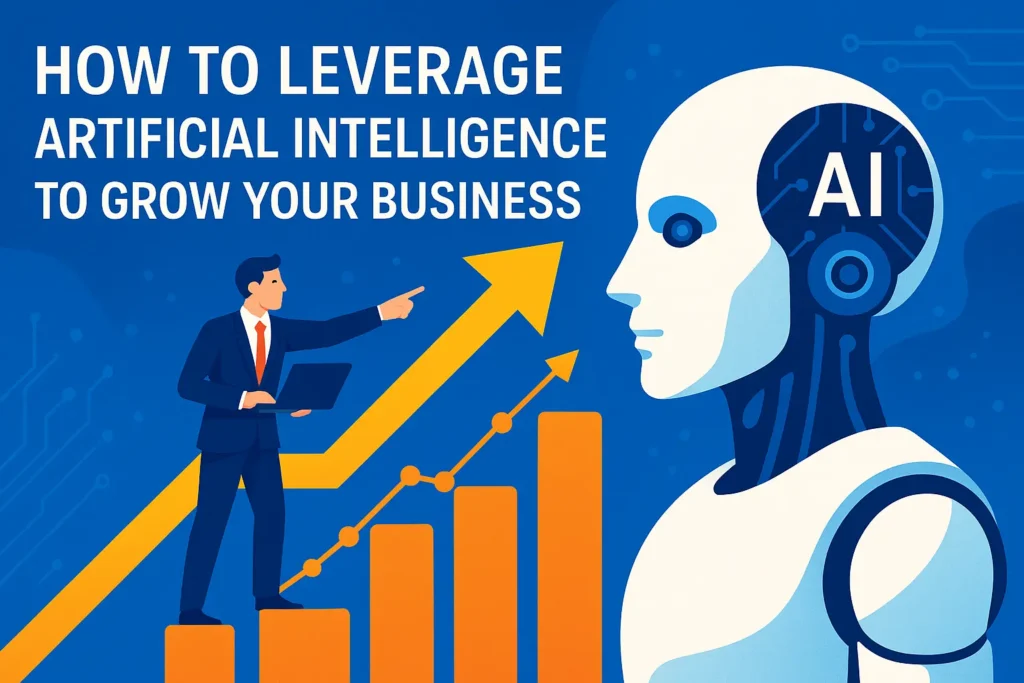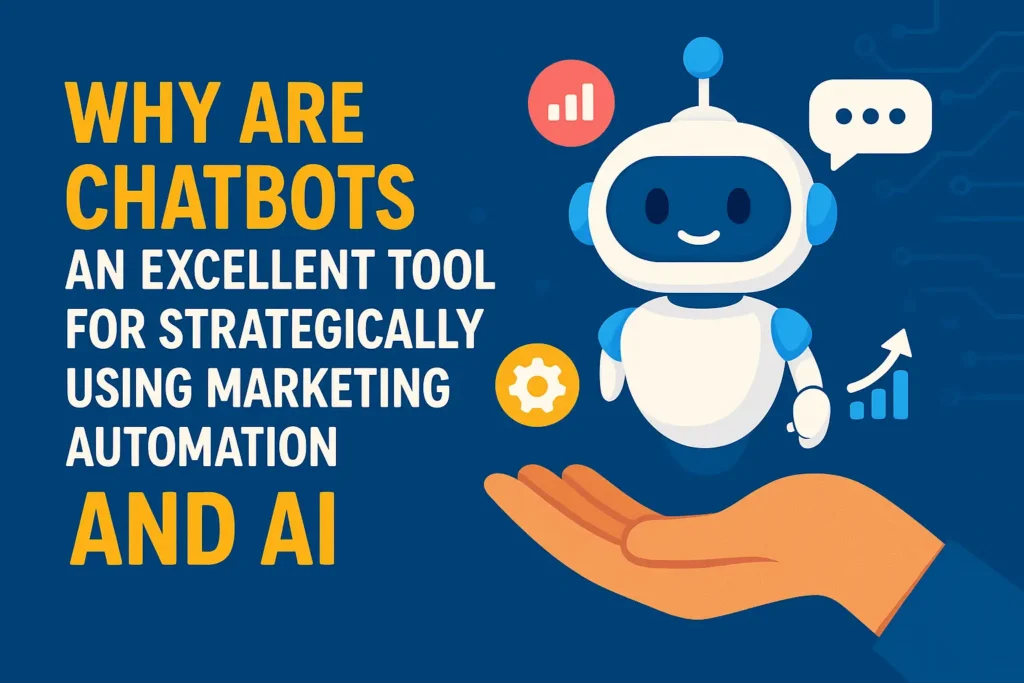In the fast-evolving world of digital marketing, staying ahead means embracing innovation, and in 2025, that innovation is powered by AI content marketing tools. Whether you’re a solo creator, a startup, or a large-scale enterprise, these tools revolutionise how content is planned, created, optimised, and distributed.
In this post, we’ll explore the best AI content marketing tools for 2025 and show how they can elevate your marketing game. We’ve covered you from free AI tools for content marketing to enterprise-level solutions.
What is AI Used for in Marketing?
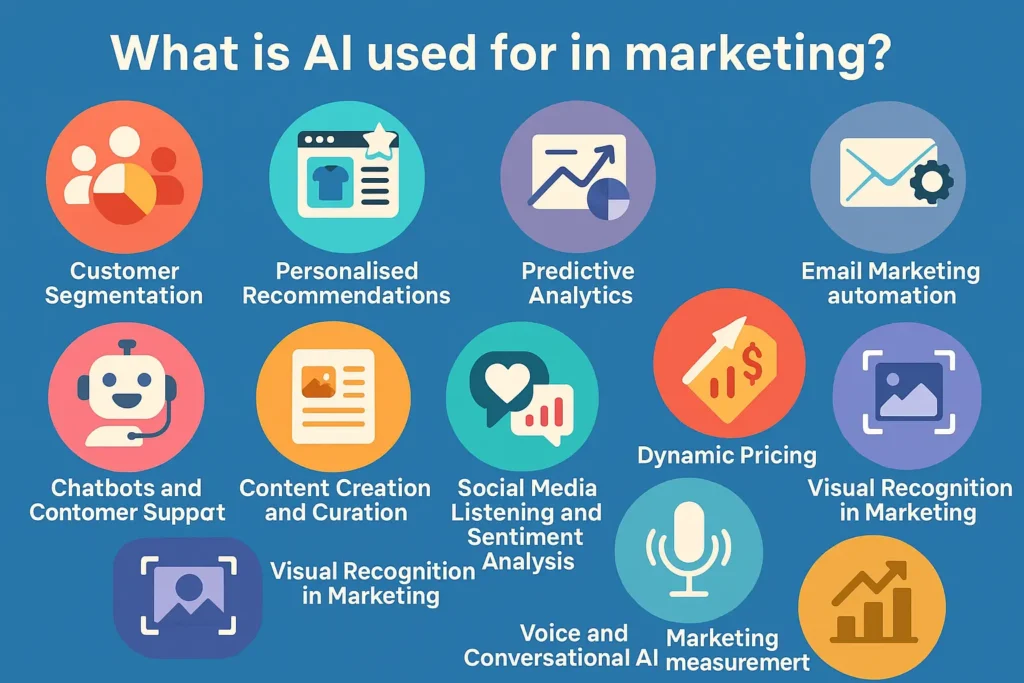
AI (Artificial Intelligence) is revolutionising marketing by enabling businesses to create more personalised, efficient, and data-driven strategies. Here’s a detailed breakdown of how AI is used in marketing:
1. Customer Segmentation
AI can analyse massive customer data (demographics, purchase history, behaviour) to group customers into meaningful segments. These segments help marketers tailor messaging and offers for each group.
Example: An online clothing store can use AI to segment customers into “frequent buyers,” “bargain hunters,” or “seasonal shoppers” and then design targeted campaigns for each.
2. Personalised Recommendations
AI-powered recommendation engines (like those used by Amazon and Netflix) use algorithms to suggest products or content based on user behaviour, preferences, and past interactions.
Benefits:
- Increased conversion rates.
- Higher customer satisfaction and loyalty.
3. Predictive Analytics
AI can predict future customer behaviour based on historical data. This includes predicting which leads are most likely to convert, when customers might churn, or what products they may buy next.
Applications
- Sending reminder emails just before a customer is likely to reorder.
- Identifying at-risk customers and targeting them with retention offers.
4. Chatbots and Customer Support
AI-powered chatbots provide 24/7 support on websites, apps, and messaging platforms. They answer common queries, help users navigate, and even assist with purchases.
Advantages
- Improves response time and user experience.
- Reduces human workload.
5. Content Creation and Curation
AI tools like ChatGPT can help marketers quickly and efficiently generate blog posts, social media content, ad copy, and email campaigns.
Content Curation
AI can also scan vast amounts of online content to find and recommend relevant articles, videos, or social media posts to share with audiences.
6. Email Marketing Automation
AI helps optimise email marketing by:
- Choosing the best time to send emails.
- Personalising subject lines and content.
- Segmenting lists for tailored messages.
This results in better open rates, click-throughs, and conversions.
7. Ad Targeting and Optimisation
AI can automatically bid for ad space and optimise ad performance in real-time. It determines the best ad channels, placements, audiences, and timing.
Platforms
- Google Ads
- Facebook Ads
- LinkedIn Ads
AI ensures that ads are shown to the right people at the right time, improving ROI.
8. Social Media Listening and Sentiment Analysis
AI tools monitor social media to understand what people say about a brand, product, or topic. They analyse sentiment—positive, neutral, or negative—and trends.
Use Cases:
- Crisis management.
- Brand reputation tracking.
- Audience engagement insights.
9. Dynamic Pricing
AI analyses demand, competitor prices, customer behaviour, and inventory to set optimal prices in real-time.
Example:
- E-commerce platforms are adjusting prices during festive sales or peak demand periods.
10. Visual Recognition in Marketing
AI can analyse images and videos to identify logos, faces, and products. This helps marketers:
- Track brand visibility in user-generated content.
- Understand how products are being used or displayed by consumers.
11. Voice and Conversational AI
Voice search optimisation and AI assistants like Alexa or Google Assistant are opening new marketing channels. Brands are optimising content for voice queries and building voice-based experiences.
12. Marketing ROI Measurement
AI tracks and analyses the performance of various marketing channels and campaigns, helping marketers understand what’s working and what’s not.
Key Metrics AI Can Analyse:
- Customer acquisition cost (CAC)
- Return on ad spend (ROAS)
- Lifetime value (LTV)
AI in marketing enhances precision, efficiency, and personalisation. From understanding consumer behaviour to automating content and optimising ads, AI allows marketers to focus on strategy and creativity while the technology handles the data crunching and execution.
How AI is Used in Marketing?
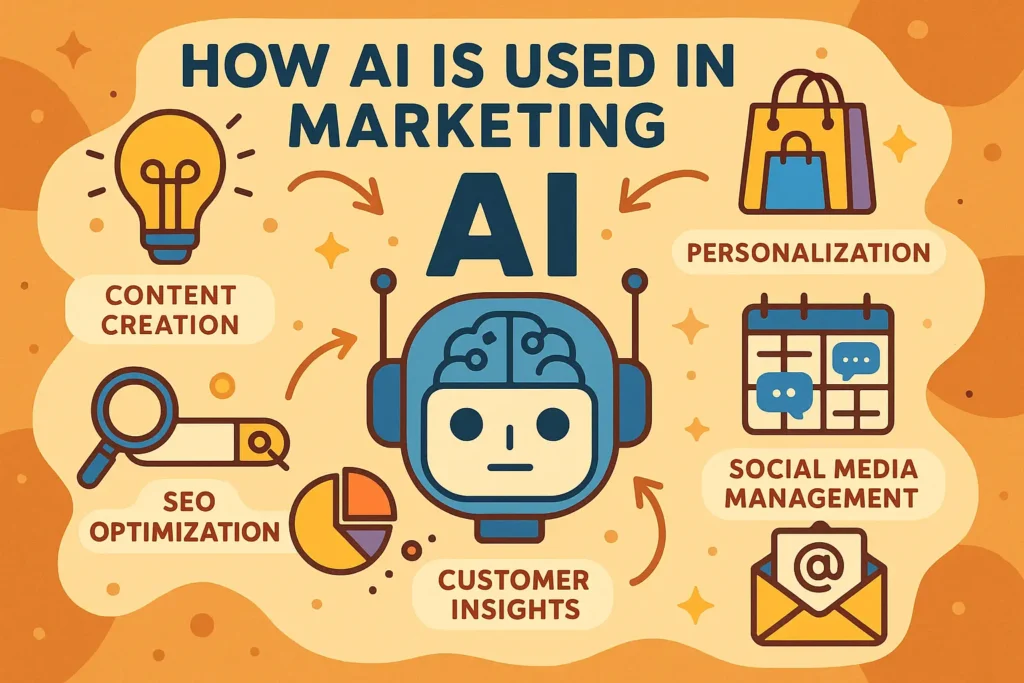
Below are the ways AI can be used in marketing:
- Content Creation: AI can generate blog posts, social media captions, ad copy, product descriptions, and video scripts, speeding up workflows and maintaining consistency.
- Personalisation: AI analyses user data to deliver personalised content, recommendations, and email campaigns that increase engagement.
- SEO Optimization: AI tools help find the best keywords, optimise headings, and structure content to rank higher on search engines.
- Customer Insights: AI analyses large volumes of data (like customer behaviour and feedback) to provide actionable insights for better decision-making.
- Social Media Management: AI can schedule posts, suggest optimal times for publishing, and even generate hashtag recommendations.
- Email Marketing: AI tools optimise subject lines, segment lists, and personalise email content to increase open and click-through rates.
Best AI Content Marketing Tools for 2025
The best AI content marketing tools for 2025 are as follows:
1. ContentShake AI (for SEO blog writing)
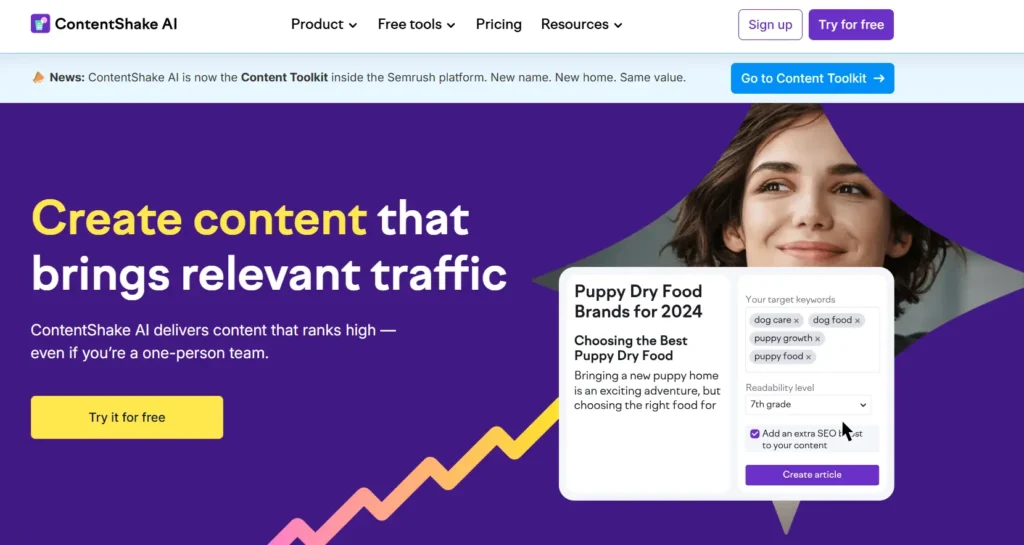
ContentShake AI is an AI-powered content writing tool developed by Semrush. It is designed to streamline the process of creating SEO-optimised blog posts and marketing copy. Leveraging Semrush’s extensive SEO data and AI capabilities, it assists marketers and content creators in producing high-quality content more efficiently.
Key Features
- AI-Powered Article Generation
- SEO Content Briefs
- Content Optimization
- Brand Voice Customisation
- Multilingual Support
- Integration with Platform
Pros
- Efficiency: Accelerates the content creation, enabling users to produce articles up to 12 times faster.
- SEO Integration: Combines AI writing with real-time SEO data, enhancing the likelihood of content ranking well in search engines.
- User-Friendly Interface: Designed to be intuitive, making it accessible for beginners and experienced marketers.
Cons
- Dependence on Semrush Subscription: Access to ContentShake AI requires a Semrush subscription, which may be an additional cost for some users.
- Content Accuracy: AI-generated content may require human oversight to ensure accuracy and relevance, particularly for niche topics.
Ideal Users
ContentShake AI suits marketers, bloggers, and businesses aiming to enhance their content creation process. It’s particularly beneficial for those seeking to produce SEO-optimized content quickly and efficiently, while maintaining a consistent brand voice.
2. Gumloop (best for AI automations)

Gumloop is a no-code AI automation platform designed to help businesses automate complex workflows without requiring coding expertise. It enables users to create custom workflows—”flows”—by connecting modular components known as nodes and providing a visual, drag-and-drop interface.
Key Features
- No-Code Workflow Builder
- AI-Powered Automation
- Seamless Integrations
- Scalable Infrastructure
- Team Collaboration
Pros
- User-Friendly Interface: The drag-and-drop builder makes it accessible for non-technical users to create and manage workflows.
- Rapid Deployment: Quickly automate processes, reducing the time spent on manual tasks.
- Extensive Integrations: Connects with various third-party applications, enhancing workflow capabilities.
Cons
- Learning Curve: While no coding is required, users may need time to familiarise themselves with the platform’s features and best practices.
- Advanced Features: Some complex automation scenarios may require a deeper understanding of the platform’s capabilities.
Ideal Users
Gumloop is well-suited for small to medium-sized businesses, marketing teams, and operations departments looking to automate repetitive tasks, integrate various applications, and enhance productivity without requiring extensive technical resources.
3. Surfer SEO (for content optimisation)
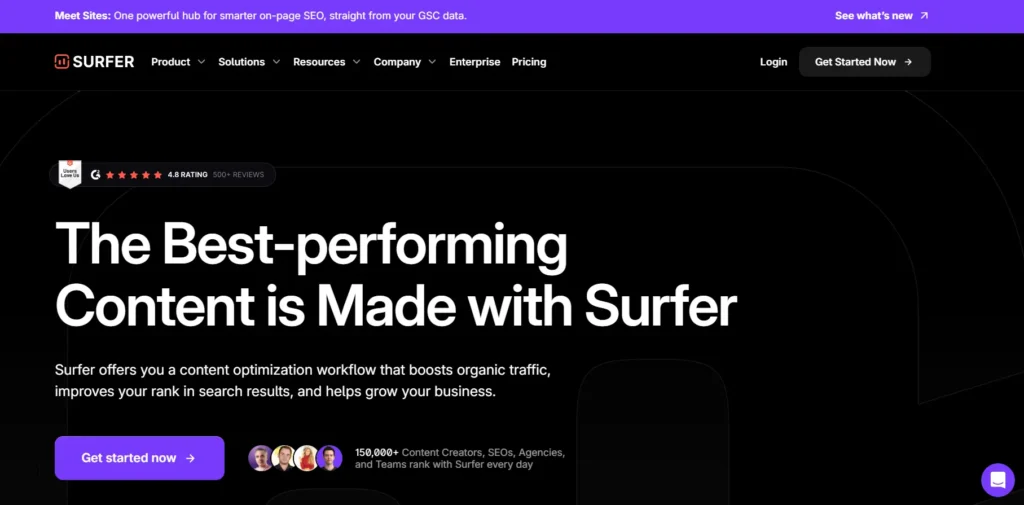
Surfer SEO is a cloud-based content optimisation platform designed to help marketers, SEO professionals, and content creators enhance their website content to achieve higher search engine rankings. By analysing over 500 on-page factors from top-performing pages, Surfer SEO provides actionable insights to optimise content structure, keyword usage, and overall SEO health.
Key Features
- Content Editor
- Content Audit
- Keyword Research Tool
- SERP Analyzer
- AI Content Generation
Pros
- Data-Driven Insights: Provides actionable recommendations based on a comprehensive analysis of top-ranking pages.
- User-Friendly Interface: Intuitive tools make it accessible for beginners and experienced SEO professionals.
- Comprehensive Toolset: Combines content editing, auditing, keyword research, and SERP analysis in one platform.
Cons
- AI Content Requires Editing: AI-generated articles may need significant human editing to ensure quality and accuracy.
- Learning Curve: New users may require time to fully utilise all features effectively.
Ideal Users
Surfer SEO is perfect for:
- Content Marketers seeking to enhance their content’s SEO performance.
- SEO Professionals are aiming for data-driven optimisation strategies.
- Agencies and Teams managing multiple websites require collaborative tools.
- Notion AI (for productivity)
4. Notion AI
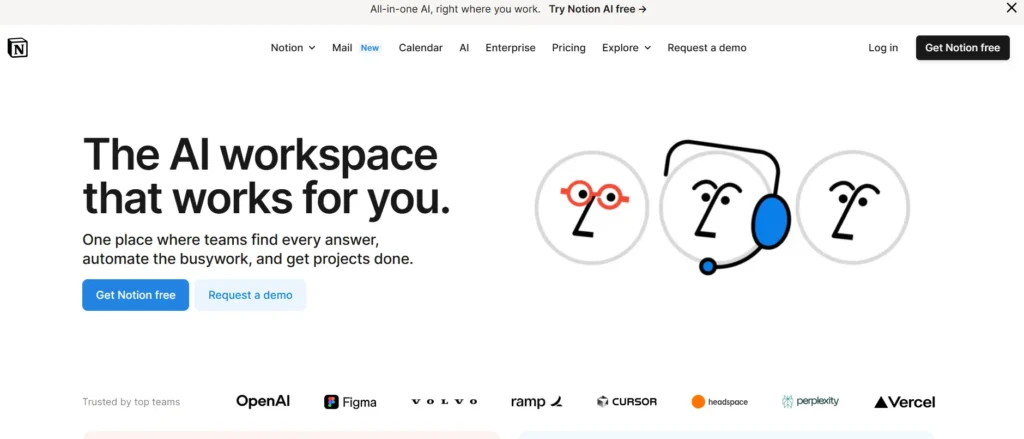
Notion AI is an integrated suite of artificial intelligence tools within Notion’s productivity platform, designed to enhance workflows by assisting with content creation, organisation, and automation. It leverages advanced language models like GPT-4 and Claude to provide contextual assistance directly within your workspace.
Key Features of Notion AI
- Writing & Editing Assistance
- Brainstorming & Idea Generation
- Meeting & Note Management
- Workspace Search & Q&A
- Automation & Task Management
Ideal For
- Individuals and teams heavily utilise Notion for documentation, planning, and collaboration.
- Users seek integrated AI tools to enhance productivity without switching between multiple applications.
- Professionals are aiming to streamline workflows and reduce time spent on routine tasks.
By embedding AI capabilities directly into the workspace, Notion AI aims to transform users’ interactions with their content, making processes more efficient and intuitive.
5. Jasper AI (for copywriting)
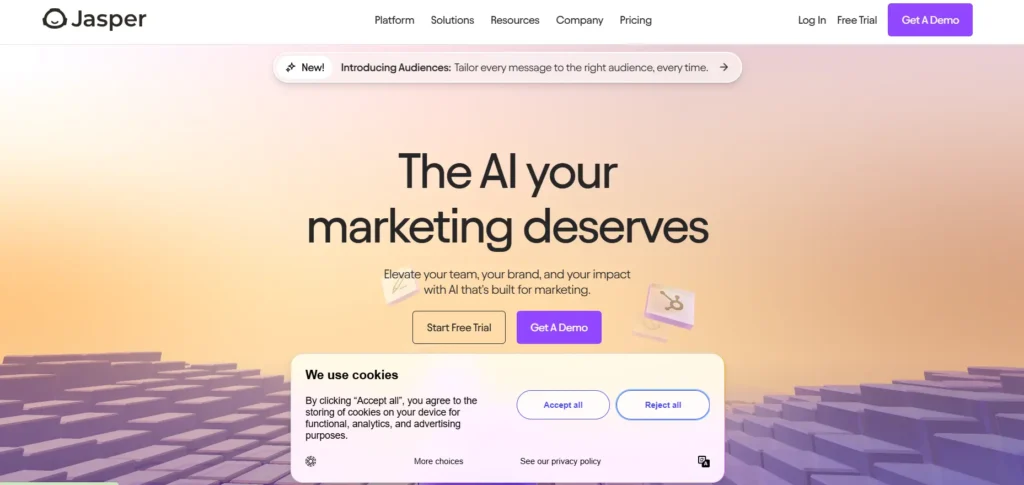
Jasper AI is a leading AI-powered copywriting tool designed to assist marketers, content creators, and businesses generate high-quality written content efficiently. Leveraging advanced language models, Jasper AI offers features tailored to various content needs.
Key Features
- Versatile Content Generation
- Tone of Voice Customisation
- Multilingual Support
- Integration Capabilities
Pros
- User-friendly interface suitable for both beginners and professionals.
- High-quality content generation that reduces writing time.
- Flexible pricing plans catering to various user requirements.
Cons
While Jasper AI generates content efficiently, reviewing and editing outputs is recommended to ensure accuracy and alignment with brand guidelines.
6. Lexica Art (for blog thumbnails)

Lexica Art is a free AI-powered image generation platform that leverages the Stable Diffusion model to create high-quality visuals from text prompts. It benefits bloggers, content creators, and marketers seeking unique and customisable blog thumbnails and other visual content.
Key Features
- AI Image Generation
- Extensive Image Library
- Prompt Customization
- User-Friendly Interface
- Free Access
Tips for Effective Thumbnails
- Be Specific: Detailed prompts yield more accurate images.
- Incorporate Style Keywords: To guide the AI, mention styles like “cartoon,” “photorealistic,” or “abstract.”
- Use Negative Prompts: Specify elements to exclude, such as “no text” or “no background clutter.”
- Experiment: Try different prompts and settings to discover unique visuals.
7. LALAL.AI (for recording audio)
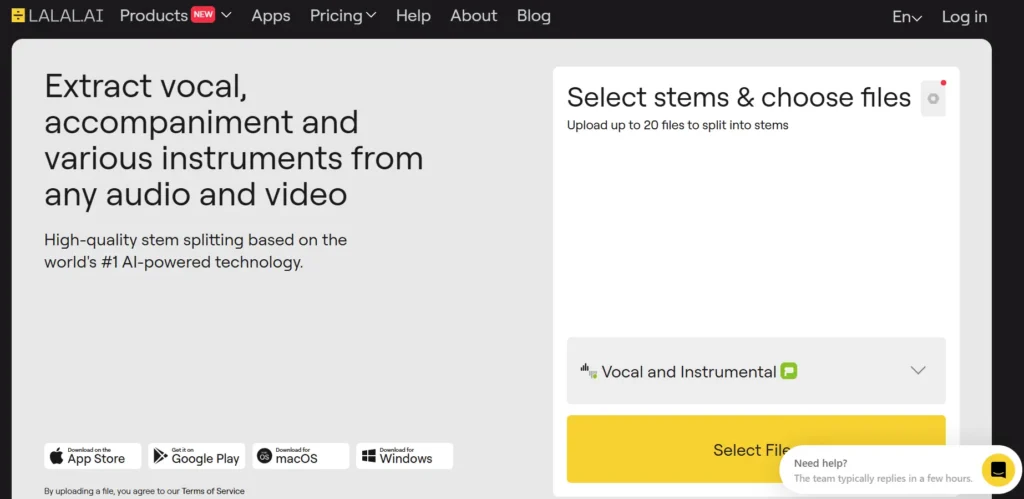
LALAL.AI is an AI-powered audio processing platform designed to enhance the quality of existing recordings by removing unwanted elements such as vocals, background noise, echo, and reverb. While it doesn’t offer direct audio recording capabilities, it is a valuable tool for refining pre-recorded audio.
Key Features
- Stem Separation
- Voice Cleaner
- De-Echo & De-Reverb
- Noise Canceling Levels
- Voice Changer & Cloner
- Enhanced Processing
How to Use LALAL.AI
- Upload Your File: Visit and upload your audio or video file.
- Select Processing Options: Choose the desired features such as stem separation, voice cleaning, or de-echo.
- Preview & Adjust: Listen to a preview of the processed audio and make any necessary adjustments.
- Download: Once satisfied, download the enhanced audio file.
8. ChatGPT
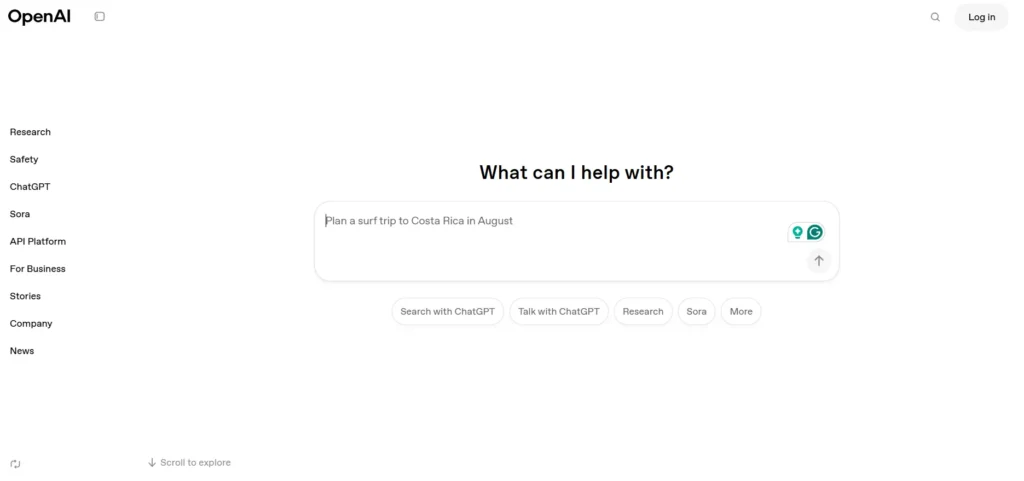
ChatGPT is an AI-powered conversational assistant developed by OpenAI, designed to assist users with a wide range of tasks, including writing, learning, coding, and creative endeavours. Since its launch in November 2022, it has become one of the most widely used AI applications globally, with over 100 million users within two months of release.
- GPT-3.5: The initial model powering ChatGPT at launch.
- GPT-4: Introduced in 2023, offering improved reasoning and comprehension abilities.
- GPT-4o: Released in May 2024, this model supports multimodal inputs, including text, images, and audio, and offers faster performance.
- GPT-4.5 (“Orion”): Launched in February 2025, it provides enhanced pattern recognition and creative capabilities.
- GPT-4.1: As of April 2025, the latest model features a larger context window and improved performance in coding and instruction-following tasks.
Key Features
- Conversational Interface: Engage in natural, back-and-forth dialogue, with the ability to ask follow-up questions and receive context-aware responses.
- Multimodal Capabilities: Analyse and generate content based on text, images, and audio inputs, particularly with GPT-4o and newer models.
- Web Browsing: Access up-to-date information by searching the web directly within the chat interface.
- Custom GPTs: Create personalised AI assistants using the GPT Store, allowing for specialised functions without coding knowledge.
- Deep Research: Utilise the Deep Research tool to generate comprehensive reports by autonomously browsing the web for information on a specified topic.
Use Cases
- Writing & Editing: Draft articles, emails, reports, and more, with assistance in grammar and style.
- Learning & Tutoring: Explain complex concepts, solve problems, and provide study assistance across various subjects.
- Programming Help: Generate code snippets, debug errors, and explain programming concepts.
- Creative Projects: Brainstorm ideas, write stories or poems, and create visual art prompts.
- Business Support: Summarise documents, analyze data, and assist in decision-making processes.
ChatGPT continues to evolve, offering increasingly sophisticated tools to assist users in various domains. For more information or to try ChatGPT, visit chat.openai.com.
9. Crayo (for short-form videos)
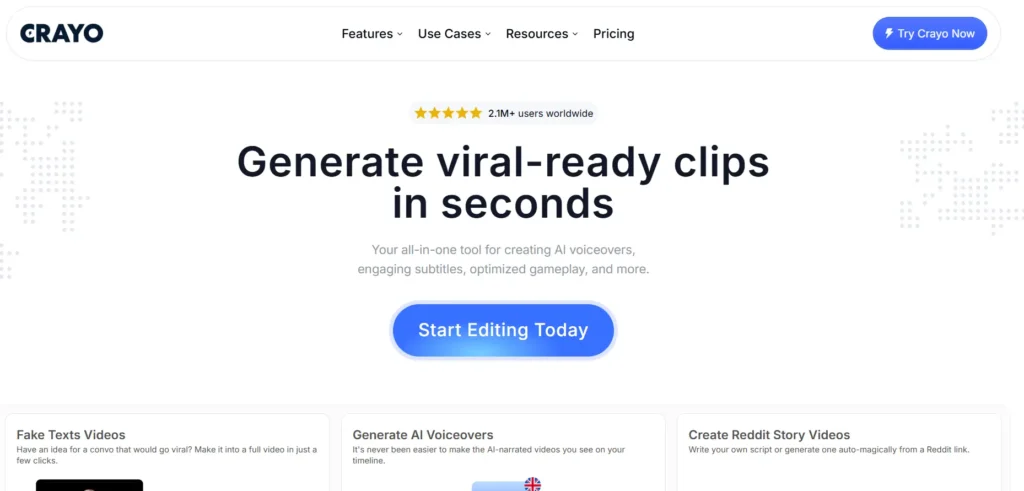
Crayo is an AI-powered platform designed to streamline the creation of short-form videos. It enables content creators to produce engaging clips swiftly and efficiently. Whether you aim to craft viral TikToks, YouTube Shorts, or Instagram Reels, Crayo offers tools to enhance your video production process.
Key Features
- AI-Generated Voiceovers
- Auto-Generated Captions & Subtitles
- Customisable Templates
- Reddit Story Videos
- Fake Text Conversations
- AI Image Generation
- Background Music Removal
- Multi-Platform Export
Pros
- Rapid video creation process, ideal for fast-paced content production.
- Comprehensive suite of tools for voiceovers, subtitles, and visual effects.
- Templates customised for various social media platforms.
- Opportunity to monetise content through programs like the TikTok Creator Fund.
Cons
- Subscription-based pricing may be a consideration for occasional users.
- Some users may experience a learning curve with advanced features.
10. Originality AI (for AI content detection)
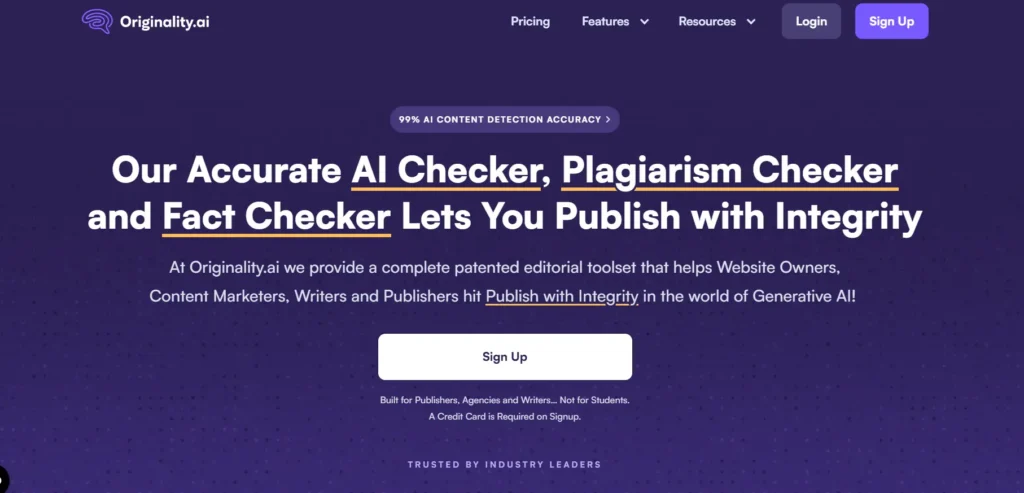
Originality AI is an advanced content detection platform for publishers, content marketers, and agencies. It specialises in identifying AI-generated text, plagiarism, and factual inaccuracies, providing a comprehensive suite of tools to ensure content integrity.
Key Features
- AI Content Detection
- Plagiarism Checker
- Fact Checker
- Readability & Grammar Tools
- Integrations
Considerations
While Originality AI is recognised for its accuracy, some users have reported that its detection engine may occasionally flag human-written content as AI-generated, especially with its Turbo 3.0 engine. Therefore, using the tool as part of a broader content review process is advisable.
Other Top AI Tools for Content Marketing
Here are other top AI tools for content marketing:
- Brandwell
- Writer
- Undetectable AI
- Fullstory
- Zapier
- Hemingway App
- Chatfuel
- Grammarly
- Albert.ai
- Headlime
- Userbot.ai
- Browse AI
- Algolia
- PhotoRoom
- Reply.io’s AI Sales Email Assistant
- Brand24
- Influencity
- Aivo
- Canva
- Surfer SEO
- CopyAI, Inc.
- HubSpot
- Hemingway app
- HubSpot Breeze AI
- Semrush
- Seventh Sense
- Zapier
- Hootsuite
- Marketo
- Salesforce
The Future of Marketing is AI-Powered: Elevate Your Strategy with the Best Tools of 2025
As we move deeper into the era of AI-driven content marketing, one thing is clear: staying competitive means embracing the tools that make content creation faster, more innovative, and more impactful. The AI content marketing tools of 2025—ranging from writing assistants like Jasper AI and ContentShake AI to automation platforms like Gumloop and visual generators like Lexica Art—are not just luxuries; they’re becoming essentials for marketers at every level.
Whether you’re focused on SEO, social media, email campaigns, or multimedia content, there’s an AI tool customised to elevate your strategy. The key is to choose the right combination that aligns with your goals, team size, and budget. While AI won’t replace human creativity, it will amplify it, handling the grunt work so you can focus on strategy, storytelling, and genuine connection with your audience.
In short, if content is king, AI is your most trusted royal advisor.


